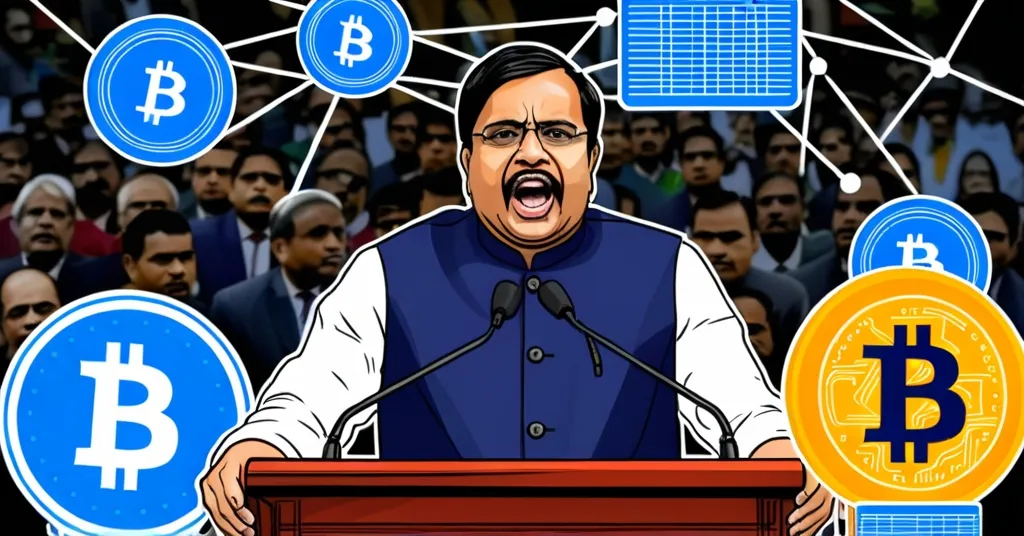Rajya Sabha MP Vows to Tackle High Crypto Taxes in India

Rajya Sabha MP Raghav Chadha Vows to Address High Crypto Tax in Parliament
Rajya Sabha MP Raghav Chadha has pledged to tackle the high cryptocurrency taxes in the upcoming parliamentary session, offering hope to India’s struggling crypto community.
- 30% flat tax and 1% TDS on crypto transactions
- Decline in trading volumes and shift to offshore platforms
- Hope for policy reforms in 2025
Since the Indian government imposed a 30% flat tax on gains from Virtual Digital Assets (VDAs)—a term that encompasses cryptocurrencies—and a 1% Tax Deducted at Source (TDS) on transactions exceeding Rs 10,000 in 2022, the nation’s crypto market has been in a stranglehold. These taxes, which many consider draconian, have not only slowed down the growth of the Indian crypto market but have also driven investors to offshore platforms in droves. The result? A significant drop in trading volumes on domestic exchanges, with an estimated potential loss of $420 million in government revenue.
In a recent social media interaction, Chadha demonstrated his commitment to the cause, stating,
“Thanks for bringing this to my notice. It’s my duty to raise issues that matter to people, and I’ll continue to do so. Many issues around the topics you mentioned need to be addressed. Will try to take up as many as I can in the next session of Parliament.”
His pledge has ignited a spark of optimism among crypto enthusiasts and industry insiders, who have long lamented the crippling effects of the current tax regime.
Critics argue that the high taxes are stifling the very innovation that could position India as a global leader in the blockchain and Web3 renaissance. Avinash Shekhar, CEO and Co-Founder of Pi42, has been vocal about the need for reform, advocating for a reduction in the tax on VDAs below 30% and a lowering of the TDS to 0.01%. He argues that these changes are crucial for creating a level playing field and boosting compliance. Other industry experts echo his call for a progressive tax structure and clearer guidelines to differentiate between long-term investments and frequent trading activities.
While Chadha’s engagement is a promising development, the road to legislative reform is fraught with challenges. Skeptics question whether political promises will translate into action, given the complexities of India’s legislative process. Yet, the crypto community remains hopeful, recognizing that even small steps towards a more balanced regulatory framework could revitalize the domestic crypto ecosystem.
Internationally, countries like Portugal and Germany offer more favorable tax treatments for cryptocurrencies, highlighting a stark contrast to India’s approach. In Portugal, for instance, crypto gains are tax-free if held for more than a year, while Germany taxes crypto at a reduced rate if held for over a year. These examples underscore the potential for India to adopt policies that could not only retain and attract investors but also foster a thriving crypto market.
Imagine a future where India’s crypto market thrives under a more supportive regulatory environment. With favorable reforms, the country could become a hub for blockchain innovation, attracting talent and investment from around the globe. It’s a vision that many in the crypto community are eager to see realized, but it will require a concerted effort from policymakers like Chadha to turn this dream into reality.
The crypto community has also taken to platforms like Reddit to discuss the impact of these taxes on their activities and the broader market.
Key Takeaways and Questions
- What are the current cryptocurrency tax rates in India?
The current tax rates include a 30% flat tax on gains from cryptocurrency transactions and a 1% Tax Deducted at Source (TDS) on transactions exceeding Rs 10,000.
- How have these taxes impacted the Indian cryptocurrency market?
The high taxes have led to a significant decline in trading volumes on Indian cryptocurrency exchanges and have driven investors toward offshore platforms, resulting in an estimated potential loss of $420 million in government revenue.
- What has Raghav Chadha committed to do about the high crypto taxes?
Raghav Chadha has committed to raising the issue of high crypto taxes in the upcoming parliamentary session.
- What reforms have been suggested by industry experts?
Industry experts have suggested reducing the TDS rate to 0.01%, implementing a progressive tax structure for crypto gains below 30%, and providing clear guidelines to distinguish between long-term investments and frequent trading activities.
- What are the potential benefits of these suggested reforms?
These reforms could boost the domestic crypto ecosystem, attract investment, and position India as a global leader in blockchain technology by fostering innovation and ensuring compliance.



